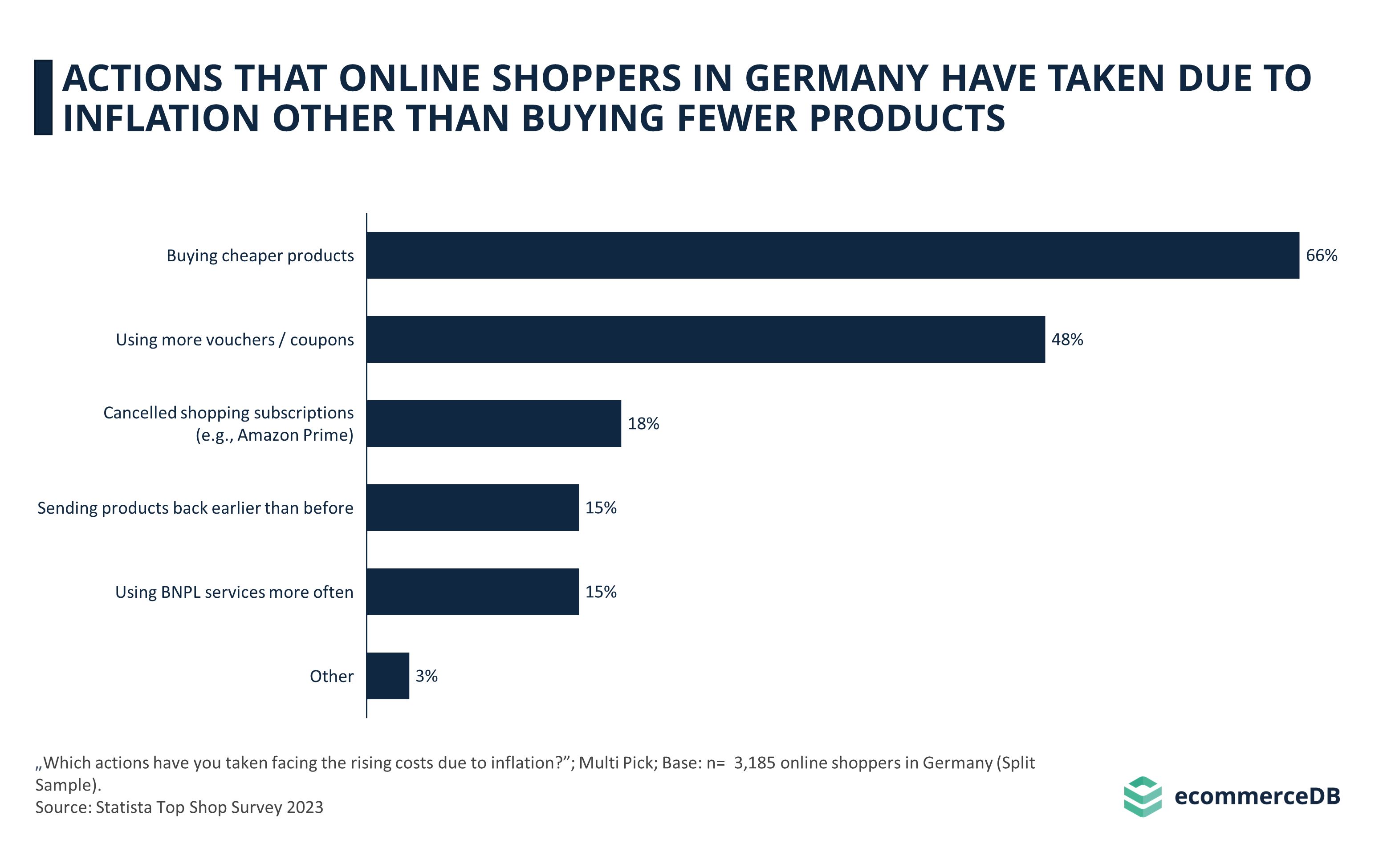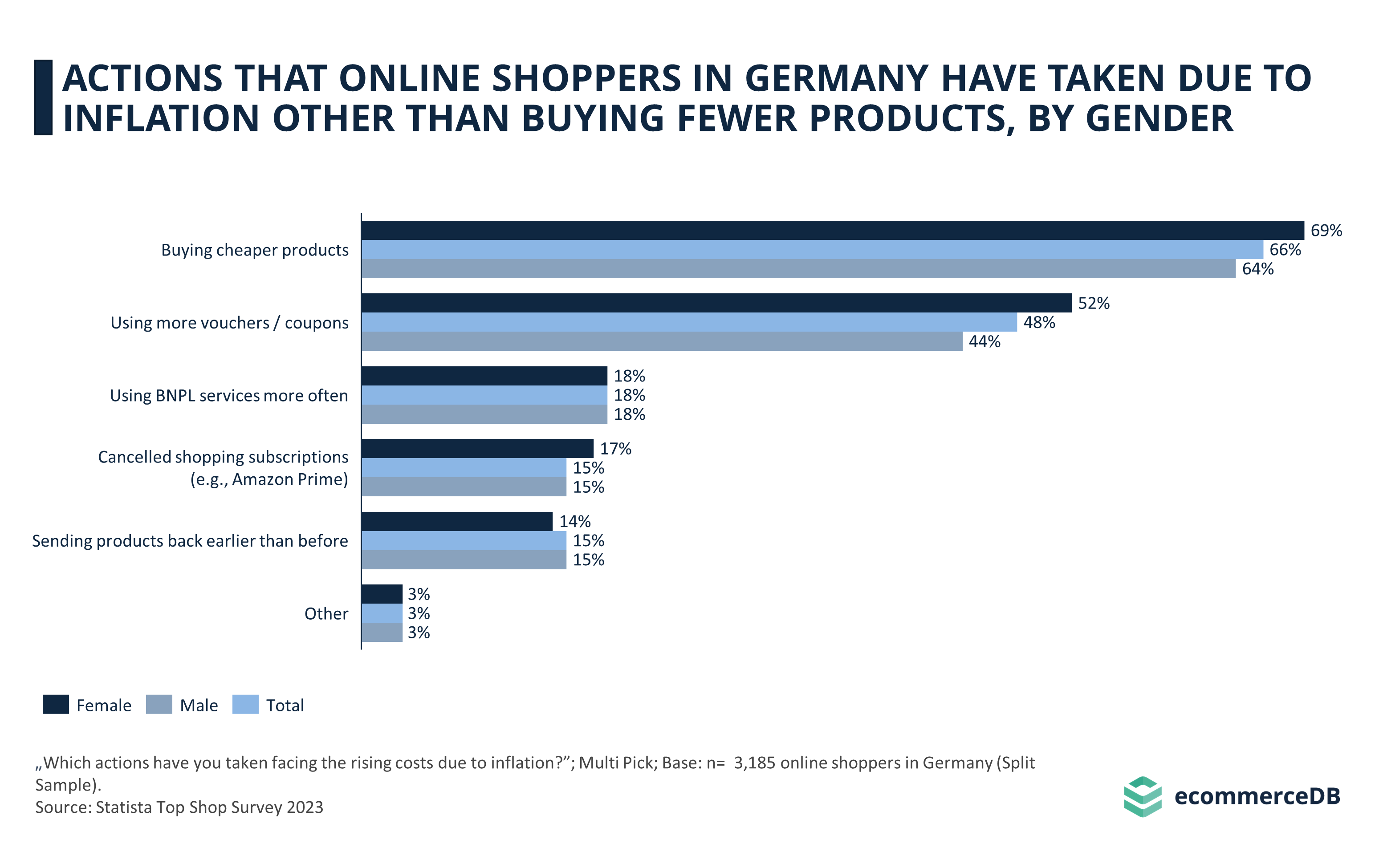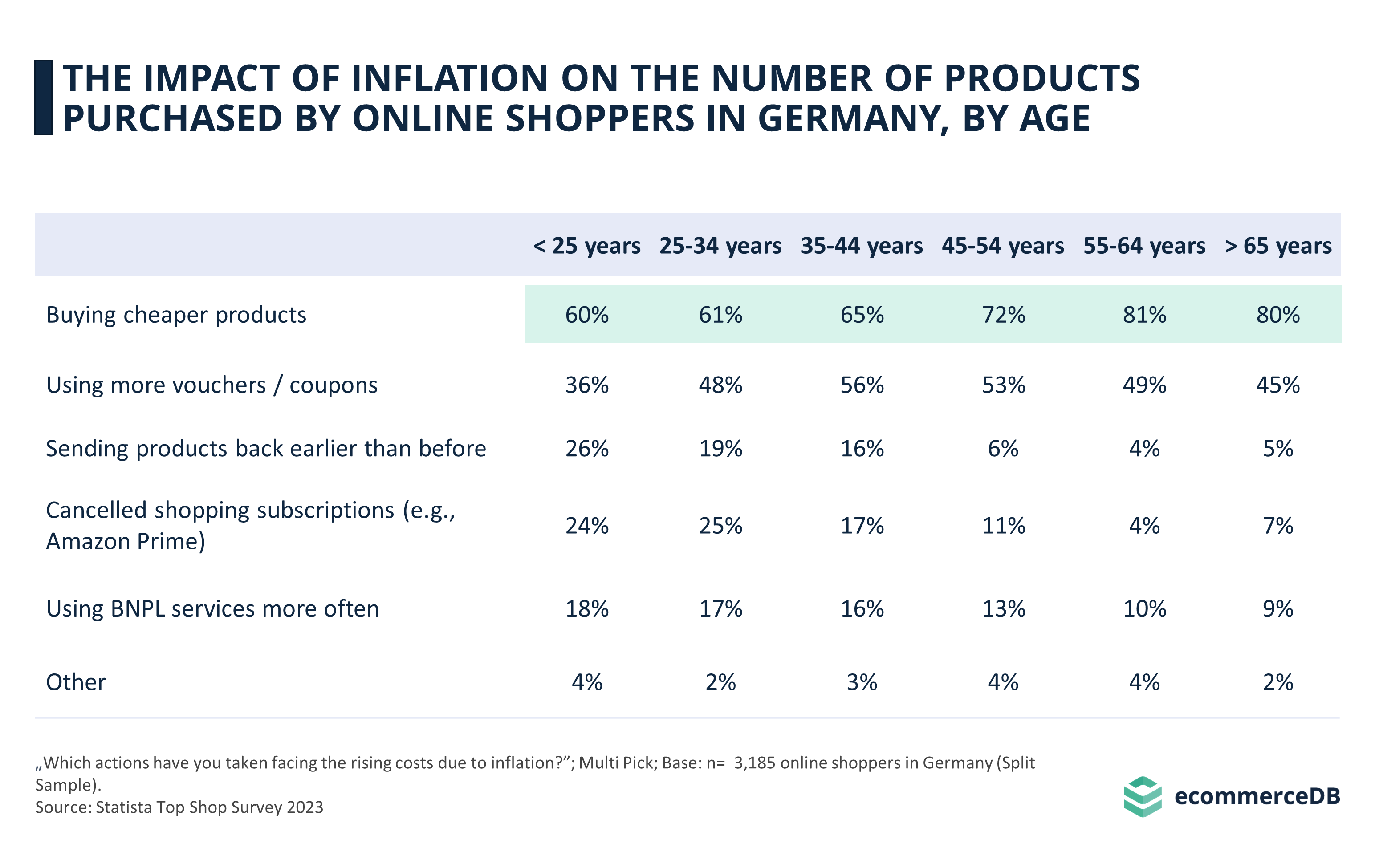Actions Online Shoppers in Germany Are Taking in the Face of Rising Prices – by Age and Gender
May 26, 2023
Download
Coming soon
Share

Inflation is a critical term in the current economic climate, referring to the increase in the cost of goods and services over time. When prices rise, consumers' purchasing power declines, as short-term price hikes outpace the long-term labor contracts. Real income, which takes inflation into account, is a more accurate measure of living standards and reflects how much consumers can afford to buy with their wages.
With inflation levels in Germany remaining considerably high at 7.2% in April 2023, the impact of inflation on consumer behavior remains relevant. For this reason, this article discusses the most common actions online consumers in Germany take to cope with rising prices.
Most Consumers Prefer to Buy Cheaper Products or Take Advantage of Bargains
Statista’s 2023 survey asked online shoppers in Germany how they acted when faced with rising prices due to inflation. 81% of all respondents reported taking action, and these are the ones we will focus on in this article. The demographics of respondents who have bought fewer products were discussed in previous insights.

Two-thirds (66%) of respondents said they buy cheaper products. Using more vouchers or coupons ranks second, with 48% of respondents choosing this option.
On a smaller scale, users have canceled their shopping subscriptions (18%) to platforms such as Amazon. 15% of consumers said they returned products earlier than before, rather than missing return deadlines or holding on to products out of indecision about whether or not to buy them. Another 15% said they use BNPL (Buy Now, Pay Later) services more often, opting to pay in installments. Other unspecified actions account for 3% of users.
How the Gender of Online Shoppers in Germany Affects Their Reactions to Rising Prices
The actions taken by users when faced with rising prices in the past year are distributed by respondent gender. Overall, women are slightly more inclined to take action compared to male shoppers.

The results show that female shoppers are more prone to purchasing cheaper products (69%) and utilizing coupons more frequently (52%). Male consumers tend to respond in this way less often, at 64% and 44% respectively.
Female shoppers are also 2 percentage points more inclined than male shoppers to have terminated their shopping subscriptions.
On the other hand, men and women consumers are equally likely to use BNPL services more often due to inflation (18%), and men are inclined to return products earlier (15%) than women (14%). However, this last difference is small, only one percentage point.
How Age Influences the Way Online Shoppers in Germany React to Rising Prices
Across all age groups, purchasing cheaper products remains the most prevalent action consumers take when faced with rising prices. However, the frequency with which consumers reported purchasing cheaper products increases with age. 60% and 61% of consumers under the age of 25 and 25-34, respectively, reported buying cheaper products, compared to 81% and 80% of online shoppers aged 55-64 and 65+, respectively.

Consumers in the medium age groups (35-44 and 45-54) are the most likely to use more vouchers, at over 50%. Younger respondents are the least inclined to use more vouchers at 36%, while the oldest cohort of respondents over 65 has the next highest share at 45%.
However, younger consumers tend to return products earlier most often, and shares for this action decrease as age increases. A similar pattern can be observed for canceled shopping subscriptions and use of BNPL services.
While respondents over the age of 45 are least likely to take these actions, they are more likely to agree to cancel shopping subscriptions and use BNPL services than when asked if they would return products earlier due to inflation.
In a linear regression analysis, the three categories that exhibit a statistically significant correlation are subscription cancellation, product returns, and BNPL usage. Moreover, age has a moderate explanatory power for the subscription and return options, with R² values of 2.5% and 2%, respectively.
Cheaper Products and Use of Vouchers Most Common Among Respondents, Less Popular Actions More Dependent on Age
Statista’s 2023 study shows that consumers, regardless of gender or age, are most likely to buy cheaper products and use more vouchers or coupons when faced with rising costs due to inflation. However, when it comes to less common responses, the demographics of the respondents have an impact as to which method they will choose to take.
While gender showed only minor differences, women shoppers are slightly more likely than men to take action. Age is a reliable, but weak predictor of whether users will cancel a shopping subscription, return products earlier than they did before, or use BNPL services more often. Accordingly, younger consumers are more likely than older consumers to take these actions.
Sources:
Related insights
Article
Walmart, Amazon & Shein: Which Store Ranks First in U.S. Online Fashion?
Walmart, Amazon & Shein: Which Store Ranks First in U.S. Online Fashion?
Article
Online Car Selling & Buying: Revenues, Forecast, Top Marketplaces & Trends
Online Car Selling & Buying: Revenues, Forecast, Top Marketplaces & Trends
Article
Fashion ReCommerce in the UK: Top Categories, Generational Attitudes, Leading Shops
Fashion ReCommerce in the UK: Top Categories, Generational Attitudes, Leading Shops
Article
Zalando, Otto & About You: Revenue, Market Growth, Business Strategies
Zalando, Otto & About You: Revenue, Market Growth, Business Strategies
Article
Online Shopping vs. In-Store Shopping in Europe: eCommerce Recovers After Post-Pandemic Dip
Online Shopping vs. In-Store Shopping in Europe: eCommerce Recovers After Post-Pandemic Dip
Back to main topics